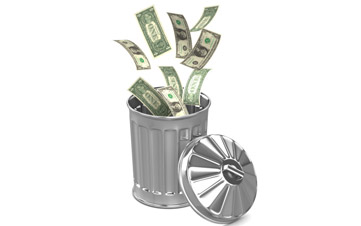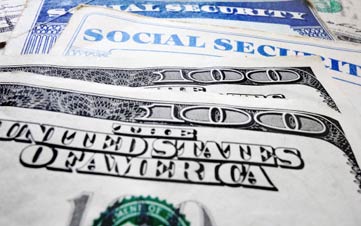10 Reasons You'll Never Retire
Retirement is the payoff at the end of a long career, the end game most workers are striving for.


Profit and prosper with the best of Kiplinger's advice on investing, taxes, retirement, personal finance and much more. Delivered daily. Enter your email in the box and click Sign Me Up.
You are now subscribed
Your newsletter sign-up was successful
Want to add more newsletters?

Delivered daily
Kiplinger Today
Profit and prosper with the best of Kiplinger's advice on investing, taxes, retirement, personal finance and much more delivered daily. Smart money moves start here.

Sent five days a week
Kiplinger A Step Ahead
Get practical help to make better financial decisions in your everyday life, from spending to savings on top deals.

Delivered daily
Kiplinger Closing Bell
Get today's biggest financial and investing headlines delivered to your inbox every day the U.S. stock market is open.

Sent twice a week
Kiplinger Adviser Intel
Financial pros across the country share best practices and fresh tactics to preserve and grow your wealth.

Delivered weekly
Kiplinger Tax Tips
Trim your federal and state tax bills with practical tax-planning and tax-cutting strategies.

Sent twice a week
Kiplinger Retirement Tips
Your twice-a-week guide to planning and enjoying a financially secure and richly rewarding retirement

Sent bimonthly.
Kiplinger Adviser Angle
Insights for advisers, wealth managers and other financial professionals.

Sent twice a week
Kiplinger Investing Weekly
Your twice-a-week roundup of promising stocks, funds, companies and industries you should consider, ones you should avoid, and why.

Sent weekly for six weeks
Kiplinger Invest for Retirement
Your step-by-step six-part series on how to invest for retirement, from devising a successful strategy to exactly which investments to choose.
Retirement is the payoff at the end of a long career, the end game most workers are striving for. But these days, with corporate pensions disappearing (only 11% of Fortune 100 companies offered traditional defined-benefit plans in 2012, down from 89% in 1985) and life spans on the rise (65-year-olds in 2010 had remaining life spans of 19.1 years, nearly two years longer than folks who turned 65 in 1990), you’re likely to be on your own when it comes to building a nest egg that may have to last 30 years or more.
Will you ever save enough to retire comfortably? Many Americans aren’t so sure. In fact, 48% of workers don’t expect to retire by age 65 -- up from only 33% in 2005, according to a recent CBS News poll. And 22% of Americans don’t think they’ll retire until they’re over 70.
We talked with financial planners from the Financial Planning Association about the common problems that trip people up on the road to retirement. Here are 10 reasons you might never retire, as well as the steps you can take to avoid these roadblocks.

You're Not Saving in a Retirement Plan
When starting a new job, one of the first benefits to ask about is the company retirement plan, such as a 401(k), 403(b) for teachers and nurses, 457 plan for police officers and other local-government workers, or the Thrift Savings Plan for federal workers and military personnel. If your employer doesn’t have one -- or you just want to set aside more money -- you can save in an IRA. If you’re self-employed, you have retirement-plan options, too, such as the solo 401(k). Regardless of the route you take, saving in a retirement plan allows your money to grow free of tax and compound more quickly.
“One of the easiest ways to accumulate wealth is to always take advantage of tax-deductible and tax-deferred savings vehicles,” says Steve Doucette, a certified financial planner in Sherborn, Mass. But although 64% of employees for private employers have access to retirement plans, only 49% actually participated in 2013, according to the Bureau of Labor Statistics. Of those with no plan, 73% said their retirement savings totaled less than $1,000, according to the Employee Benefit Research Institute’s 2014 Retirement Confidence Survey.

You Are Neglecting the Company Match
Many employers will match a certain amount of your savings in the company retirement plan. If you don’t contribute -- or don’t contribute enough -- to the plan to earn the match, that’s additional compensation you’re throwing out the window. “It is a huge mistake if you do not find a way to take advantage of an employer retirement-plan match,” says Doucette.
- The average company contribution to retirement plans in 2012 was 4.5% of pay, according to an annual survey by the Plan Sponsor Council of America. But about 34% of employers said that more than half of their plan participants are not contributing enough to take advantage of the full employer match, according to a 2013 report by WorldatWork and the American Benefits Institute.
A company match is one of the few free lunches around. Don’t let it go to waste!

You Didn't Start Saving Early in Your Career
Don’t overlook the role that time plays in compounding your savings. “One of the biggest mistakes people make when planning for retirement is underestimating the power of time,” says Michael Baker, a certified financial planner in Charlotte, N.C. Starting to save early, even with a smaller amount of money, can pay off. If, starting at age 22, you stash $2,500 every year in a Roth IRA earning an 8% annual return, at age 62 you would have $699,453. If you wait until 32 and save twice as much every year, at age 62 you would have $611,729—about $88,000 less.
Now, imagine how much bigger the difference would be if you were willing and able to increase that $2,500 annual stash from year to year. “You don’t invest your way to retirement security, you have to save your way,” says Daniel Galli, a certified financial planner in Norwell, Mass. “This requires starting early and increasing your savings each year.”
While you can’t change the past, there’s no time like the present to start saving.

You Used Your Nest Egg as a Piggy Bank
Taking a loan from a company retirement plan can be very costly. Sure, the interest you pay on the loan simply goes to yourself. But as Melissa Brennan, a certified financial planner in Dallas, says, the interest rate “is a much lower return than [you] would have earned in the market.” Plus, if you end up not paying the money back, your nest egg will suffer, and you’ll have to pay taxes and early-withdrawal penalties (unless you leave your job at age 55+) on the distribution.
To avoid tapping your nest egg, work on building up a separate emergency fund that can be tapped when an unexpected expense comes up. An emergency fund can also help keep you out of credit card debt. The less money that goes to debt, the more that can go to savings.

You Cashed Out When Switching Jobs
Thirty-five percent of all participants in 401(k) plans who left their jobs in 2013 cashed out their balances, averaging $16,000, according to an analysis by Fidelity Investments of participants in Fidelity-sponsored plans. For young participants age 20 to 39, that percentage is 41%.
Even if you have just a small amount in a company retirement plan, cashing out when you switch jobs can be detrimental to your nest egg in the long run. “It’s as if the participant sees his account as ‘found money’ instead of seed money for retirement,” says Brennan. You’re giving up years of compounded tax-deferred growth, plus you have to pay tax and early-withdrawal penalties (if you’re younger than 55 in the year you leave your job) on the entire distribution now.
The smarter move is to keep the money in a retirement plan. There are three ways to do this: Leave the money in your old company’s 401(k), if you’re allowed to; roll the money over to an IRA; or roll the cash into your new company’s 401(k), if allowed. Whichever route you choose, keeping the money in a tax shelter to grow for decades is a winning strategy.

You're Not Saving Enough
These days, many employers will automatically enroll you in the company retirement plan at a default contribution rate (generally 3% of your pay). Some company plans offer “automatic escalation,” incrementally increasing your savings rate over time.
- If you don’t increase your savings rate well beyond the default, you will have a hard time building a sizable nest egg.
Most experts say that workers need to save up to 15% of their annual pay. The good news: That 15% includes any company match. So if your company matches 4.5% of pay, that’s only 10.5% a year that you have to pony up.

You Haven't Played Catch Up
All workers have annual limits on how much they can stash in retirement accounts. For 2014, that’s $17,500 a year for 401(k)s and $5,500 a year for IRAs.
But starting at age 50, you get an opportunity to turbocharge your retirement nest egg with higher contribution limits. And that can help late savers play catch-up. For 2014, workers age 50 and older can put an extra $5,500 a year in their 401(k) plan and an extra $1,000 in an IRA. Save $23,000 in a 401(k) per year for 15 years starting at age 50, and, at an annual rate of return of 8%, you’ll have $674,459 at age 65. That can go a long way toward shoring up your nest egg if you didn’t save much earlier in your career.
Use the Financial Industry Regulatory Authority’s 401(k) Save the Max Calculator to find out how much you have to stash away per pay period to reach the maximum this year.

You Saved for Kids' College Instead of Your Retirement
You may want to put some money toward college savings, but don’t shortchange your own future. “Funding 100% of your child’s college education before funding your retirement” is a common mistake, says Jeff Nauta, a certified financial planner in Belmont, Mich.
To help cover the costs of college, consider whether your student might qualify for need-based financial aid or merit-based aid. Scholarships may help fill the gap, too. And consider college affordability: Use our College Finder tool to sort through our list of the 300 best college values in the U.S. Our rankings factor in financial aid packages and give extra credit to schools that hold down student debt.

You Haven't Created a Retirement Budget
If you don’t know how much you might spend, it will be hard to know whether you have saved enough by the time you’re eager to stop working. When you finally crunch the numbers, you may discover a funding shortfall that requires you to work longer than you had hoped.
As you approach retirement, consider tracking your expenses for several months to a year in advance. Then factor in potential big-ticket items, such as a new roof or a long trip, that you want to cover. “Many clients are shocked to learn just how much they actually need to live on, and they have not planned well for it,” says Michael Lecours, a financial planner in West Hartford, Conn.

You Haven't Planned to Maximize Social Security Benefits
For many people, once they hit age 62 and become eligible for Social Security benefits, they take the money and run -- only to discover that it’s not enough to live on. After all, claiming at 62 means accepting 25% less in benefits -- for the rest of your life -- than if you waited until age 66. (For folks born in 1955 and later, the take-it-at-62 cut will be even deeper.) So it’s back to work to make up the difference.
But waiting until at least full retirement age -- that’s 66 for those born between 1943 and 1954 -- to claim Social Security gets you 100% of your benefit, and waiting until age 70 scores you an extra 32% a month, plus cost-of-living adjustments, for the extra four-year wait. Maximizing benefits can help stretch your nest egg to last your lifetime and can provide the foundation for you to retire -- and stay retired.
Couples who want immediate income can delay benefits and make use of smart claiming strategies to generate a spousal benefit. If you claimed early and now regret it, consider four ways to boost benefits.
Profit and prosper with the best of Kiplinger's advice on investing, taxes, retirement, personal finance and much more. Delivered daily. Enter your email in the box and click Sign Me Up.

-
 Look Out for These Gold Bar Scams as Prices Surge
Look Out for These Gold Bar Scams as Prices SurgeFraudsters impersonating government agents are convincing victims to convert savings into gold — and handing it over in courier scams costing Americans millions.
-
 How to Turn Your 401(k) Into A Real Estate Empire
How to Turn Your 401(k) Into A Real Estate EmpireTapping your 401(k) to purchase investment properties is risky, but it could deliver valuable rental income in your golden years.
-
 My First $1 Million: Retired Nuclear Plant Supervisor, 68
My First $1 Million: Retired Nuclear Plant Supervisor, 68Ever wonder how someone who's made a million dollars or more did it? Kiplinger's My First $1 Million series uncovers the answers.
-
 States That Tax Social Security Benefits in 2026
States That Tax Social Security Benefits in 2026Retirement Tax Not all retirees who live in states that tax Social Security benefits have to pay state income taxes. Will your benefits be taxed?
-
 What to Do With Your Tax Refund: 6 Ways to Bring Growth
What to Do With Your Tax Refund: 6 Ways to Bring GrowthUse your 2024 tax refund to boost short-term or long-term financial goals by putting it in one of these six places.
-
 What Does Medicare Not Cover? Eight Things You Should Know
What Does Medicare Not Cover? Eight Things You Should KnowMedicare Part A and Part B leave gaps in your healthcare coverage. But Medicare Advantage has problems, too.
-
 12 Great Places to Retire in the Midwest
12 Great Places to Retire in the MidwestPlaces to live Here are our retirement picks in the 12 midwestern states.
-
 15 Cheapest Small Towns to Live In
15 Cheapest Small Towns to Live InThe cheapest small towns might not be for everyone, but their charms can make them the best places to live for plenty of folks.
-
 15 Reasons You'll Regret an RV in Retirement
15 Reasons You'll Regret an RV in RetirementMaking Your Money Last Here's why you might regret an RV in retirement. RV-savvy retirees talk about the downsides of spending retirement in a motorhome, travel trailer, fifth wheel, or other recreational vehicle.
-
 The 24 Cheapest Places To Retire in the US
The 24 Cheapest Places To Retire in the USWhen you're trying to balance a fixed income with an enjoyable retirement, the cost of living is a crucial factor to consider. Is your city the best?
-
 The Six Best Places to Retire in New England
The Six Best Places to Retire in New Englandplaces to live Thinking about a move to New England for retirement? Here are the best places to land for quality of life, affordability and other criteria.
